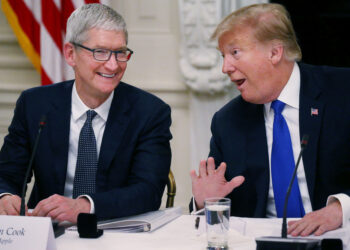By WIRED
Midway through Ferrari, the iconic Italian motor-racing impresario sits at a table with his adolescent son, born of his mistress. Enzo Ferrari sketches a design for a 12-cylinder engine, in long, chalky swoops, like a seamstress designing an elegant gown. He explains to his boy that the curved, sweeping angles create better airflow, which means more power, and more speed. “When a thing works better,” Ferrari, played by Adam Driver, tells the child, “usually it is more beautiful to the eye.”
Ferrari’s cars exemplified this principle. They were efficient. They were, at their peak, world-historically fast. They were also sleek, even sexy—covetable as much for their power as their aesthetics. More than Ford, or BMW, or even Bugatti, the word Ferrari conjures a rare unity of form and function. Enzo Ferrari was equal parts engineer and artist. In this capacity, he’s an ideal subject for Ferrari’s director, Michael Mann.
“To run a race car company,” says Mann, speaking via Zoom from his Los Angeles office, “is not that different from being an architect, or a film director. You have to use a lot of outside capital to manifest something that’s important to you—and perfect in your imagination.”
For more than 40 years, Mann has worked to close that gap between the idealized imagination, and the world beyond it. He has crafted exhaustively detailed, finely-tuned films, which are also exceptionally stylish. Early, in Thief (1981) and Manhunter (1986), he realized gritty, borderline nightmarish visions of the realms of criminals, cops, and killers, in gauzy, neon-dreamy hues that proved massively influential. As executive producer on the popular NBC crime drama Miami Vice, he engineered a pop, pastel, art deco revival that would leave its mark on everything from video games (Grand Theft Auto: Vice City owes Mann a debt, if not some residual checks) to men’s casual couture.
In the 1990s, Mann would swap out the lambent gloss for steelier palettes, lending cooler, chillier intensity to the crime epic Heat (1995), and the based-on-a-true-story whistleblower drama The Insider (1999). In the new millennium, he was an early adopter of digital technology, exploring its potential and pushing its possibilities in Collateral (2004), his big-screen Miami Vice feature (2006), the John Dillinger caper Public Enemies (2009), and the globe-trotting hacker thriller Blackhat (2015). With their jittery camerawork and conspicuously digital textures, these latter films alienated some viewers, and tested Mann’s ability to make bank at the box office. Ferrari is his first feature film in the near-decade since Blackhat.
During Mann’s long absence from the multiplexes, something strange happened. The director developed a cultlike following among younger cinephiles, who championed his post-2000s digital features. Critics held online symposiums on Miami Vice and Public Enemies. The indispensable New York City screening database Screen Slate sells a “MANN BOY” T-shirt in their online merch shop. Fans have taken it upon themselves to reedit Blackhat, in an approximation of the director’s original vision. His debut, Thief, about a freelance crook extorted by crime bosses, has gained pride of place in the personal canons of admirers who respond to its withering view of capitalist labor relations. This makes Michael Mann a unique figure in contemporary film culture: a cult director whose movies have cleared over a billion dollars at the box office.







Discussion about this post